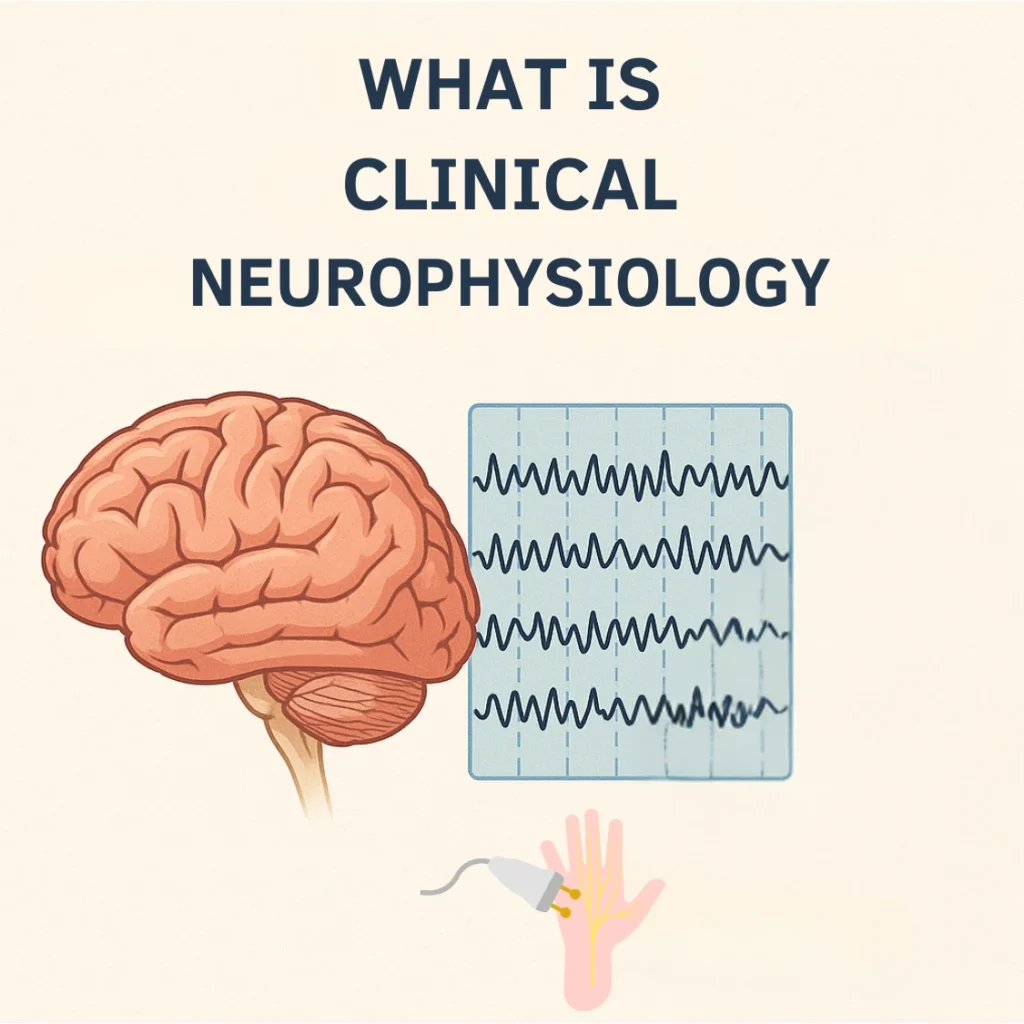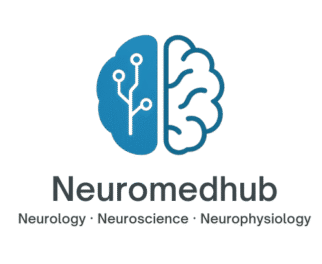
What is Clinical Neurophysiology? It is a medical specialty that focuses on understanding how the nervous system works in real time. By using advanced tests such as EEG, EMG, nerve conduction studies, and sleep studies, clinical neurophysiology helps doctors diagnose and manage conditions like epilepsy, neuropathies, and sleep disorders.
Introduction
Clinical Neurophysiology may sound like a complex term, but in simple words, it is the medical field that studies how the nervous system works using advanced tests that measure the brain, nerves, and muscles. Unlike scans such as MRI or CT, which show the structure of the brain, neurophysiological tests show how the nervous system actually functions in real time.
This specialty plays a central role in diagnosing and managing many neurological conditions such as epilepsy, nerve injuries, sleep disorders, and neuromuscular diseases.
What Is Clinical Neurophysiology?
If you are wondering what is clinical neurophysiology, it is essential to know that it combines neurology and physiology to test how the nervous system works. It focuses on the functional assessment of the nervous system, from the brain to the spinal cord, nerves, and muscles.
Doctors in this field are called clinical neurophysiologists. They use a range of tests to detect abnormal electrical activity in the nervous system, providing essential information that cannot be obtained from imaging alone.
Main Clinical Neurophysiology Tests
EEG (Electroencephalography) – Brain Activity Test
Records the brain’s electrical activity using electrodes placed on the scalp.
Used in: epilepsy, coma, encephalopathy, brain monitoring in intensive care, and sleep disorders.
Advantages: safe, painless, and non-invasive.
EMG (Electromyography) – Muscle and Nerve Function Test
Measures muscle activity with tiny needle electrodes.
Used in: detecting neuromuscular disorders like myopathy, neuropathy, ALS, or radiculopathy.
Note: may cause mild discomfort but is very informative.
See >>> Basics of electromyography (EMG)
Nerve Conduction Studies (NCS) – Nerve Signal Test
Evaluates the speed and strength of electrical signals in nerves.
Used in: carpal tunnel syndrome, peripheral neuropathies, Guillain-Barré syndrome, and other nerve conditions.
Polysomnography – Sleep Study
Monitors brain waves, breathing, heart rate, oxygen levels, and body movements during sleep.
Used in: diagnosing sleep apnea, narcolepsy, insomnia, and parasomnias (such as sleepwalking).
Evoked Potentials – Testing Brain Responses
Measure the brain’s response to sensory stimulation (visual, auditory, or somatosensory).
Used in: conditions like multiple sclerosis, optic neuritis, or hearing pathway disorders.
Why Clinical Neurophysiology Matters
Clinical Neurophysiology is vital because it:
Provides early diagnosis for many neurological disorders.
Helps monitor treatment effectiveness over time.
Bridges the gap between clinical symptoms, imaging, and final diagnosis.
Improves patient care through accurate functional evaluation of the nervous system.
Who Performs Neurophysiological Tests?
These tests are performed by specialized doctors called clinical neurophysiologists, often assisted by trained technologists.
The doctor interprets the results and integrates them into the patient’s overall clinical picture.
This collaboration ensures accurate diagnosis and guides treatment decisions.
Real-Life Example
Imagine a patient with frequent fainting spells. MRI and CT scans look normal. An EEG test reveals abnormal discharges consistent with epilepsy. This shows how clinical neurophysiology can detect what imaging cannot.
Another example: a patient with hand weakness. Nerve conduction studies confirm carpal tunnel syndrome, allowing for early treatment and prevention of permanent damage.
FAQ on Clinical Neurophysiology
Is neurophysiology the same as neurology?
No. Neurology is the broader field that diagnoses and treats brain and nerve diseases. Clinical Neurophysiology is a subspecialty focused on specialized diagnostic tests.
Are neurophysiological tests painful?
Most are painless (EEG, NCS, sleep studies). EMG may cause mild discomfort due to tiny needle electrodes.
How long do these tests take?
EEG: 20–40 minutes (longer for monitoring).
EMG + NCS: 30–60 minutes depending on number of muscles/nerves studied.
Sleep study (Polysomnography): Overnight.
Who should see a clinical neurophysiologist?
Patients with unexplained seizures, numbness, weakness, sleep problems, or suspected nerve/muscle disorders.
Resources
Conclusion
Clinical Neurophysiology is not just a complex term — it is a powerful tool in modern neurology. By studying how the nervous system functions in real time, it helps doctors diagnose conditions earlier, monitor treatments better, and improve patient outcomes.
If you or someone you know has seizures, muscle weakness, nerve pain, or sleep issues, consulting a clinical neurophysiologist may provide answers that imaging tests alone cannot.
In summary, the answer to what is clinical neurophysiology lies in its ability to evaluate the brain, nerves, and muscles in real time, improving diagnosis and patient care.

